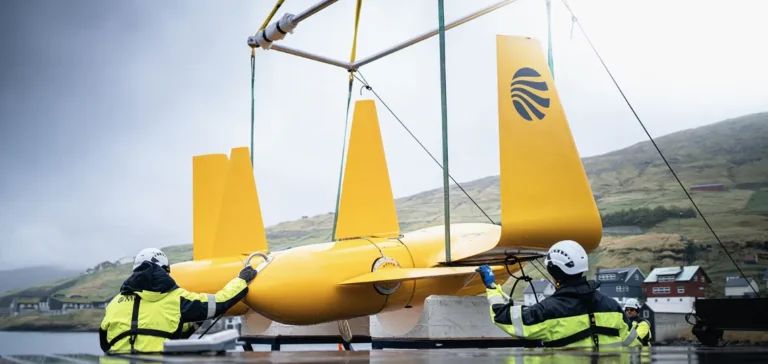Swedish ocean energy developer Minesto will lead an international project to establish an autonomous tidal-powered microgrid in the Faroe Islands. The four-partner consortium will receive a grant of 25 million Swedish crowns (€2.1mn) from the Swedish Energy Agency, contributing to a total estimated project budget of approximately 56 million Swedish crowns (€4.7mn). The commissioning of the complete installation is scheduled for 2026 at Minesto’s existing site in Vestmanna. The project will utilise an enhanced tidal power plant from the company’s Dragon-class range.
Strategic and technological partnership
Minesto will manage the project in partnership with Capture Energy, a company specialising in microgrid technology management. Faroese energy supplier Sev will provide expertise in autonomous local grid management and carry out a detailed feasibility study for future commercial installations in the Faroe Islands. The Swedish Environmental Research Institute (IVL Swedish Environmental Research Institute) will deliver a comprehensive analysis of the proposed solution’s environmental impact.
The technical solution includes integrated battery storage within the microgrid, designed to provide continuous and autonomous electricity supply to users disconnected from the main grid. The first commercial phase targets non-connected islands in the Faroe Islands, currently heavily reliant on imported fossil fuels.
Global economic potential
The global potential market for tidal-powered microgrids is estimated at approximately €300 billion, according to figures provided by Minesto. The application spectrum ranges from small-scale units of a few kilowatts to multi-megawatt systems. Minesto intends to market its Dragon-class tidal power plants within this market without requiring significant technical adjustments.
Minesto’s Chief Executive Officer, Martin Edlund, described the operation as strategic, highlighting opportunities for broader commercial partnerships. “This financial support from the Swedish Energy Agency is essential for the advancement of our commercial roadmap,” said Mr Edlund, emphasising the economic potential of this specific market.
Island energy context
The Faroe Islands, similar to many other remote island regions, face specific energy challenges mainly due to the import of fossil fuels. This dependence creates significant vulnerabilities, particularly regarding price fluctuations and supply disruptions. The project’s goal is to harness local tidal energy potential to ensure continuous electricity supply necessary for communities disconnected from the main grid.
The consortium will begin project preparations in August, including site studies and comprehensive environmental assessments.






















